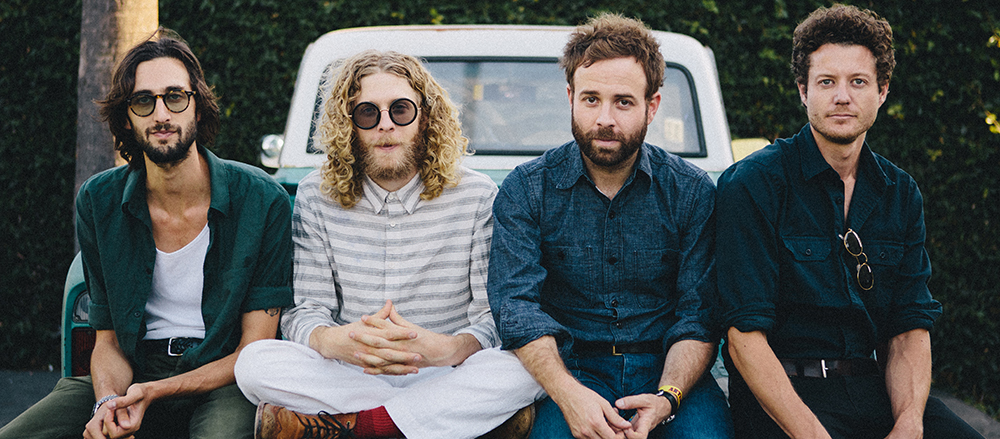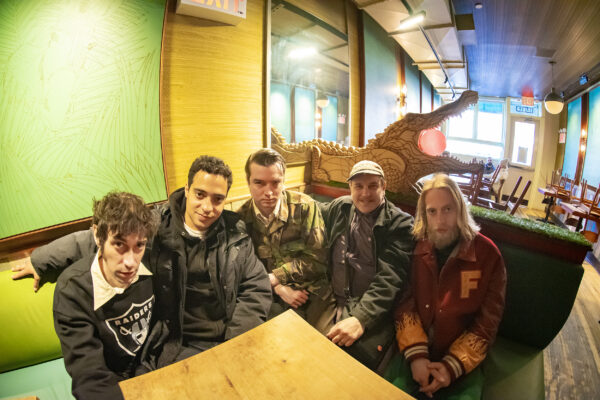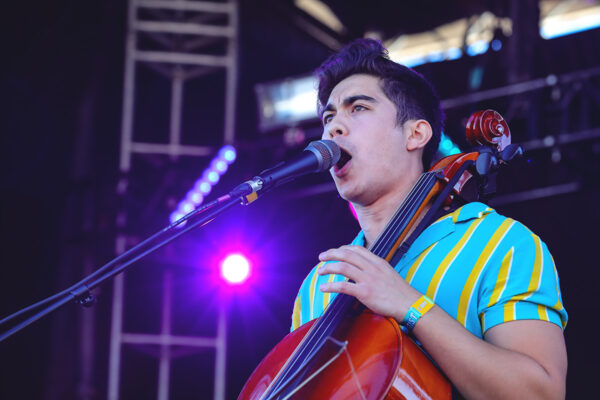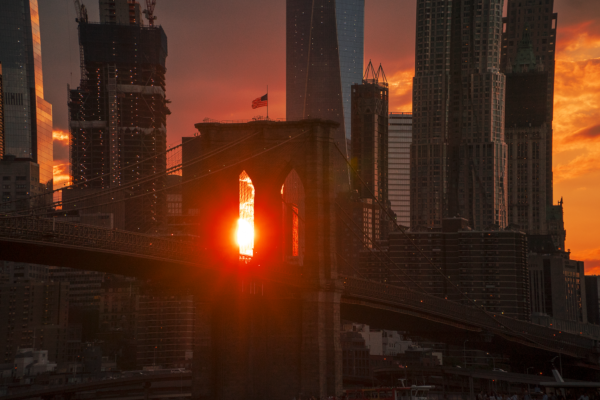In an era when iTunes encourages listeners to cut and paste their way through a track listing, Dawes has consistently upheld the merits of the full-length studio album. Although besides aiding in the preservation of a format first made sacred by the very luminaries they are often linked with, the bands records have habitually shined a light on every side of their sound. Continuing down that path with the September release of We’re All Gonna Die, the groups fifth LP further proves that while change is good, in the right hands, it can be riveting. Delivering their most varied and ambitious album to date, their newest collection connects a livewire energy with a vivid sense of calmness and ease, pivoting between rushes of stinging rock that will make you nod your head and arrangements so spare and delicate they’ll leave you holding your breath. “I think that bands turn into living things,” frontman Taylor Goldsmith told Pancakes and Whiskey this fall. “The same way that we all wake up everyday wanting to get better or be nicer or grow a little bit, I think that a band does the same thing.”
Arriving in stores a little over a year after the 2015 release of All Your Favorite Bands, the group recorded their latest album with producer Blake Mills. Sketching things out with an acoustic guitar and vocal to start, the songwriter explained how he and his brother, drummer Griffin, bassist Wylie Gelber and piano player Lee Pardini would then take each arrangement and “dress it up how we felt fit.” Running the gamut from the sharpness of “One of Us” to the stillness of “We’re All Gonna Die,” the songs on this record show Dawes at their most hard hitting and restrained. Yet for every instance of vocal distortion and a purely cutting guitar solo, there are moments of tranquility that are quietly powerful. “We were trying to find this balance of what the sound was going to be and it’s a little different for each guy,” Goldsmith said of the title song. “In the very beginning of that track, all that our piano player, Lee, was doing was hitting a really, really low note that you could sort of hear ringing over the track. And Griffin used -instead of a normal snare drum- he used a snare drum that’s almost the size of a softball. It’s this really small thing so it made the snare sound a certain, specific way and I was playing this strange, distorted pianet keyboard. And so anyway, it’s like we all had these little elements, and again, we’re all playing very little. I’m hitting that one chord once and Lee’s hitting that one note once. So by doing it all how we arrange it, it all of a sudden becomes a recognizable track. And then when that song comes on, even though it’s a chord progression that like every other song ever written uses, it kind of has its own personality to it. That is something that we really wanted to pay close attention to. In the past, for me, I wanted to create that identity with the composition itself.” Pointing to previous album cuts like “Something in Common,” “Side Effects” and “Stories Don’t End,” as examples of tracks that are rich with chords, he spoke about how the band had decided to peel back the layers for their newest record. “In that way it was like, ‘Well if it’s these unexpected chord changes, maybe that will be what’s recognizable and definitive,’” he recalled of those past arrangements. “In this case, it was more about, ‘Let’s take something that’s actually very simple and let’s let the way that we treat it and the way that we play it be what is the recognizable fingerprint on it.’”
Although another recognizable fingerprint has always been the tiny details and pronounced imagery of their lyrics. “You have to pay attention to how you see things and be honest with what your impression of it all is because that’s going to dictate how someone else hears it,” Goldsmith said of his own approach, before discussing what he is drawn to as a listener. “For me, my favorite writing has always been the stuff that could go really deep and really have this sort of revelatory feeling of you finding some sort of deeper truth in it, but at the same time being very clear.” And while he used to prefer to only write in certain ways, he now encourages himself to think about the process differently. “I feel like when I did have certain habits or patterns, I would use those as kind of cop-outs to not work,” he explained. “Like one time, I think I was writing the Stories Don’t End record and if I wrote a verse in one day, I would be like, ‘Great, that’s the whole verse. I only write a verse a day.’ It gave me the freedom to not keep working. But then when I’d just kind of force myself, like, ‘No, you can write this song in a day,’ then I would. And I used to say that I couldn’t write on the road or that I rather I didn’t write on the road, and then therefore I couldn’t because I never even tried. But once I stopped telling myself that, it no longer was a self-fulfilling prophecy. So I like to believe that I have no set way of writing a song. Sometimes an idea for the words comes first, sometimes there’s a musical idea. Sometimes, and this has happened more and more recently, where I’ll -in order to get a lyrical idea out- I’ll write it to a progression that I know that I don’t even want to keep. That happened with “As If by Design,” and it happened with “Things Happen,” where I wrote those songs -those words- to completely different melodies.”
Writing a lot of his compositions on the same acoustic he’s had since he was a teenager, he said the guitar was an eighteenth birthday present from none other than Blake Mills. Having played together previously in Simon Dawes, Mills is also a longtime friend of the group in its current incarnation, although We’re All Gonna Die marks the first time he’s produced one of their records. “We’re cut from the same cloth in terms of what our sensibilities are musically,” Goldsmith said. “We speak the same exact language. If he wants to take it to a certain place, I have an easier time understanding why and what he means and it’s wonderful to be able to trust someone like that. I mean we’ve been very lucky to have that with most everyone we’ve ever worked with, but with Jonathan Wilson, with Dave Rawlings, with Blake – these were all close, close friends. Blake most of all, because we met at like eleven years old. And then when we made Stories Don’t End it was with Jacquire King – who we didn’t know – and I was so proud of the work that we all did together, but it really taught us a lesson with like, ‘Wow, that’s scary going into it.’ We were very lucky that we felt comfortable and confident with our relationship once we got started.”
Looking back on the groups past and present, he outlined their shared motivations and perspective when it comes to creating new music. Detailing how creative developments often happen unconsciously, he spoke about the thrill of new sounds and the will of the band to always remain who they are. “We by no means were like, ‘Let’s do something different, let’s freak people out,’” he said of their latest songs. “We were just like, ‘How do we stoke ourselves out in the studio?’ -the same way that we’ve always wanted to. But at the same time, let’s be who we are because we actually really like who we are. I love going on stage every night and playing songs from all five of our records. A lot of bands that do new music – like that sound truly different – kind of resent their past or something and you don’t hear them do any of the old material. For us, it’s like we’re excited that it adds a new flavor to things, but at the same time it doesn’t feel, or at least we don’t want it to feel, like we’ve abandoned our sense of identity. We just wanted to kind of embellish upon it.”
“AN EVENING WITH DAWES” LIVE TOUR DATES
Tickets at http://dawestheband.com/tour
January 10— San Diego, CA— Belly Up
January 11— Phoenix, AZ— Crescent Ballroom
January 13— San Luis Obispo, CA— Fremont Theater
January 14— Santa Barbara, CA— Lobero
January 20— Lake Tahoe, NV— Montbleu Resort
January 26— Dallas, TX— Bomb Factory
January 28— Austin, TX— Stubbs
January 29— Oklahoma City, OK— ACM @ UCO
January 31— Little Rock, AR— Rev Room
February 1— St. Louis , MO— The Pagaent
February 3— Minneapolis, MN—State Theatre
February 4— Iowa City, IA—Englert Theatre
February 6— Madison, WI— Barrymore Theatre
February 7— Omaha, NE— The Waiting Room
February 8— Sioux Falls, SD— The Orpheum
February 10— Boulder, CO— Fox Theatre
February 11— Aspen, CO— Belly Up
February 12— Salt Lake City, UT— The Depot
February 21— San Francisco, CA— Fillmore
February 22— Portland, OR— Wonder Ballroom
February 24— Seattle, WA— Showbox
February 25— Missoula, MT— Wilma Theatre
February 26— Billings, MT— Pub Station Ballroom
February 28— Des Moines, IA— Wooly’s
March 3— Birmingham, AL— Iron City
March 4— Atlanta, GA— Variety Playhouse
March 5— Durham, NC— DPAC
March 7— Wilmington, DE— The Grand Opera House
March 8— Washington, DC— Lincoln Theatre
March 10— New York, NY— Beacon Theatre
March 11— Boston, MA— Orpheum
March 12— Hartford, CT— Infinity Hall
March 14— Northampton, MA— Academy of Music Theatre
March 15— Ithaca, NY— State Theater
March 17— Toronto, ON— The Opera House
March 18— Kalamazoo, MI— State Theatre
March 19— Indianapolis, IN— The Vogue
March 21— Tulsa, OK— Cain’s Ballroom
March 22— Santa Fe, NM— Lensic Performing Arts Center
March 23— Flagstaff, AZ— Orpheum Theater
April 1— Los Angeles, CA— The Theatre at Ace Hotel
April 21— Louisville, KY— The Brown Theatre
April 23— Charleston, SC— High Water Festival*
April 25— Asheville, NC— Orange Peel
April 26— Knoxville, TN— Bijou Theatre
April 28—Nashville, TN— Ryman Auditorium
April 29— Nashville, TN— Ryman Auditorium
April 30— Chattanooga, TN— Revelry Room
May 2— Wilmington, NC— Greenfield Lake Amphitheatre
May 3— Charlotte, NC— Fillmore
*Festival Date
(More Dates To Be Announced)
Article: Caitlin Phillips




